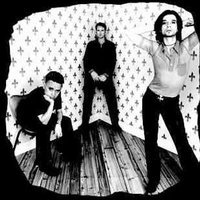Like families, highly functional work teams are coveted anomalies. They are held up, analyzed and dissected by a huge industry of authors and consultants who try to crack their code and help the rest of us get the most out of our teams.
Some of the highest performing rock bands are extremely dysfunctional. It doesn’t make their lives easier or more fun. But it doesn’t necessarily get in the way of their performance, either. Take Depeche Mode, the highest selling electronic band of all time. “When it comes to communication we’re still not the best,” admitted Martin Gore, the band’s chief songwriter. “We’re still slightly dysfunctional.” But he adds, “Maybe that’s what makes us tick.”

English: Depeche Mode live at the O2 Wireless Festival in 2006 (Photo credit: Wikipedia)
Some types of dysfunction can be good. Here are three examples.
Distrust. Trust is usually considered a mark of a high-functioning team. But too much trust can hurt team performance. In a study of self-managed teams, George Mason University professor Claus Langfred found that when team members have a high level of autonomy, trust actually reduced performance.
When trust is high, team members may not check up on each other. They trust, so they don’t verify. In fact, when trust on the team is high, monitoring may be interpreted as an insult. It may lead to hurt and anger. If, on the other hand, the team has a certain level of distrust, or at least tolerance for monitoring, then team members can actually talk about the kinds of things that will make their work better. As I’ve written before, bands like The Rolling Stones have stayed together because their commitment to the band is stronger than their grudges.
Not talking. In his 2010 memoir, Life, Keith Richards expressed anger at his band mates that he had held inside for decades. Should he have talked it out with his band? Surely not talking about your feelings is a sign of dysfunction. Not necessarily. Sometimes words get in the way. When emotions run high, talking can actually make things worse. Research shows that when people are emotionally upset, they can’t always put their thoughts into feelings because their brain activity occurs in the visual and emotional parts of the brain rather than the reasoning and language parts of the brain. Even strong positive emotions can make us speechless. Some teams may do better to talk less about their feelings.
Sometimes team members don’t talk things out because they come from families that didn’t talk about their feelings. So in a situation of conflict, they clam up because that’s what they’ve always done.
But there are alternative to talking. Rock bands often resolve their differences by doing their work: playing music. Sometimes, they can express their emotions better through music than through words. Bands often reference their internal turmoil in their lyrics, from U2’s “One” (“We’re one but we’re not the same, well we hurt each other then we do it again”) to The Rolling Stones in “Mixed Emotions” (“Let’s bury the hatchet, wipe out the past, make love together, stay on the path”).
Music can communicate emotions and meanings that words cannot. Music making can also get team members into a flow. They can get on the same page by playing together. Making music is an “aesthetic” alternative to talking. A study of string quartets found that successful quartets didn’t talk about their differences but rather channeled their energy toward performing their music.
Doing a creative activity together creates positive feelings and solidarity. Anyone whose work is creative—programmers, algorithm developers, designers of all types, writers, consultants—stands to benefit from less talking and more actual doing of the work together. Sometimes, instead of setting up another meeting, it’s best to do like the rock band and just play.
Tension. Tension is usually considered another sign of dysfunction. Teams try to avoid tension or at least dissipate it. But many rock bands thrive on tension. It energizes them. When they can channel the tension they build within their team toward their performances, the outcome is often a better show. In Depeche Mode 101, a 1989 documentary about Depeche Mode’s Music for the Masses Tour, singer David Gahan admits that the stage is a place where he releases tension. And when you need to send out enough energy to engage 60,000 people, as Depeche Mode did at their Rose Bowl show on that tour, you need to marshal up all the sources of energy you can get.
Keeping the band dysfunctional may have been a good move on Depeche Mode’s part. Other bands struggle with how to maintain the urgency of their music as band members grow up, sober up, and find stability in their personal lives. Tension can be motivating. It can create just the right amount of discomfort to keep seeking.
As Aerosmith’s Steven Tyler wrote, “Mutual animosity is a necessary part of a band’s chemistry. It’s all egos in a band, anyway. Would you want to be in a group who were all clones of yourself?” Later he adds, “You want opposites in a band, that’s what makes the big wheel turn and the sparks fly.”
For rock stars, the day they get too comfortable may be the day their team ceases to function.



